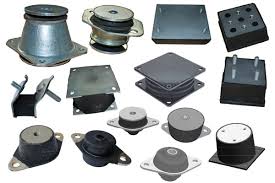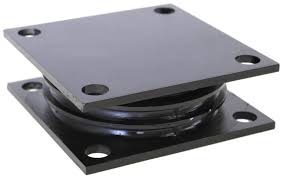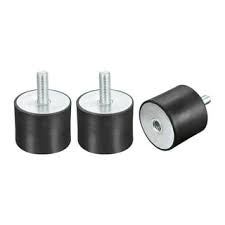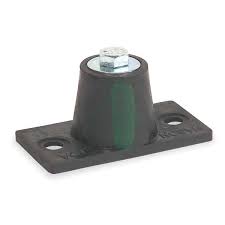Enhance Equipment Performance with Heavy-Duty Vibration Isolators
Heavy-duty vibration isolators are essential components for improving the performance of industrial equipment. By minimizing the transmission of vibrations, these isolators help to reduce wear and tear on machinery, improve precision, and enhance overall operational efficiency. In this article, we will explore the benefits of heavy-duty vibration isolators and how they can be used to enhance equipment performance in various industrial applications.
Heavy-duty vibration isolators are designed to minimize the effects of vibrations and shock on equipment, ensuring optimal performance and longevity. They are commonly used in industrial and manufacturing settings where heavy machinery and equipment are subjected to vibrations from nearby operations or external sources. These isolators are typically made of durable materials such as rubber or steel and are engineered to effectively absorb and reduce the transmission of vibrations, thus preventing damage and minimizing downtime. By using heavy-duty vibration isolators, equipment performance is enhanced, maintenance costs are reduced, and overall operational efficiency is improved.
Heavy-duty vibration isolators are critical components used to protect sensitive equipment from the potentially damaging effects of vibrations and shock. These isolators are engineered to absorb and minimize the transmission of vibrations, ensuring that machinery operates at peak performance. They are commonly utilized in a wide range of industries, including manufacturing, aerospace, automotive, and medical, where precision equipment is sensitive to external vibrations. By effectively isolating equipment from excessive vibrations, heavy-duty isolators help extend the lifespan of machinery, reduce maintenance costs, and improve overall productivity. They also contribute to a safer and more comfortable working environment by minimizing the transfer of vibrations to surrounding structures and personnel.
The Importance of Heavy-duty Vibration Isolators in Industrial Machinery

Heavy-duty vibration isolators play a crucial role in industrial machinery as they are designed to absorb and reduce the vibrations and shocks produced by heavy equipment. These isolators help to protect the machinery, surrounding structures, and workers from the potentially damaging effects of excessive vibration. In industrial settings, heavy-duty machinery often operates at high speeds and under demanding conditions, leading to significant levels of vibration. Without proper isolation, these vibrations can lead to premature wear and tear on the equipment, increased maintenance costs, and potential safety hazards. Additionally, excessive vibration can also result in noise pollution, which can be a nuisance to workers and nearby residents. By incorporating heavy-duty vibration isolators into industrial machinery, manufacturers can improve the overall reliability and performance of their equipment. These isolators are often made from materials such as rubber or stainless steel and are designed to effectively dampen vibrations and isolate them from the surrounding environment. This helps to prolong the life of the machinery, reduce maintenance requirements, and create a safer and more comfortable work environment. In summary, the importance of heavy-duty vibration isolators in industrial machinery cannot be overstated. These components are essential for minimizing the negative impact of vibrations, ensuring the smooth and efficient operation of industrial equipment, and promoting a safer and more productive workplace.
Key Factors to Consider When Choosing Heavy-duty Vibration Isolators

1. Load capacity: It is important to consider the maximum load that the vibration isolator can support to ensure it can handle the weight of the equipment or machinery it is designed to protect. 2. Frequency and amplitude of vibration: Different vibration isolators are designed to handle specific frequency and amplitude ranges. It is crucial to match the isolator to the frequency and amplitude of the vibrations it will be exposed to. 3. Environmental conditions: Consider the temperature, humidity, and other environmental factors where the vibration isolators will be installed, as these can affect their performance and longevity. 4. Mounting type: There are various mounting options for vibration isolators, including bolt-down, stud-type, and plate-type mounts. The mounting type should be chosen based on the specific installation requirements. 5. Isolation efficiency: The effectiveness of a vibration isolator in reducing vibrations transmitted to the equipment is a critical factor to consider. Look for isolators with high isolation efficiency to ensure optimal protection. 6. Maintenance requirements: Some vibration isolators may require regular maintenance to ensure continued performance. Consider the maintenance needs and factor them into the decision-making process. 7. Compatibility with equipment: Ensure that the vibration isolators are compatible with the specific equipment or machinery they will be used to protect, taking into account any size or weight restrictions. 8. Cost: While cost should not be the only factor considered, it is important to weigh the cost of the vibration isolators against their performance and durability to make an informed decision.
How Heavy-duty Vibration Isolators Can Improve Equipment Performance

Heavy-duty vibration isolators can improve equipment performance by effectively reducing the transfer of vibrations from one source to another. This is crucial in industrial and mechanical settings where machinery and equipment are constantly producing vibrations that can negatively impact performance and longevity. By installing heavy-duty vibration isolators, equipment can experience reduced wear and tear, decreased noise levels, improved stability, and increased overall productivity. These isolators are specifically designed to absorb and dampen vibrations, preventing them from affecting nearby equipment or structures. In addition, heavy-duty vibration isolators can also contribute to a safer work environment by minimizing the risk of equipment failures or malfunctions caused by excessive vibrations. This can lead to fewer maintenance issues, reduced downtime, and cost savings in the long run. Overall, the use of heavy-duty vibration isolators is essential for ensuring optimal equipment performance and longevity in various industrial and mechanical applications.
Common Applications for Heavy-duty Vibration Isolators in Construction

Heavy-duty vibration isolators are commonly used in construction for a variety of applications. Some common uses include isolating heavy machinery suchjson_ fields, crushers, and conveyors to reduce vibrations and minimize the impact on surrounding structures. They are also used to isolate HVAC equipment and generators to reduce noise and vibration transmission to the building structure. In addition, heavy-duty vibration isolators are often utilized to isolate piping and ductwork to prevent vibration transmission to the building or surrounding equipment. These isolators are designed to withstand heavy loads and provide durable and effective vibration isolation in demanding construction environments.
The Role of Heavy-duty Vibration Isolators in Reducing Noise Pollution
Heavy-duty vibration isolators play a crucial role in reducing noise pollution by effectively isolating and dampening vibrations generated by heavy machinery and equipment. These isolators are designed to absorb and dissipate vibrational energy, preventing it from being transmitted to the surrounding environment as noise. By reducing the transmission of vibrations, heavy-duty isolators help minimize the impact of industrial and mechanical operations on the surrounding area, ultimately contributing to a quieter and more peaceful environment. Additionally, they also help to extend the lifespan of machinery by reducing wear and tear caused by excessive vibration. Overall, the use of heavy-duty vibration isolators is an important factor in mitigating noise pollution in industrial and commercial settings.
Advantages of Using Heavy-duty Vibration Isolators in Heavy Machinery
Heavy-duty vibration isolators offer several advantages when used in heavy machinery. They help to reduce noise levels, protect sensitive equipment from vibration-induced damage, and enhance overall performance and longevity of the machinery. Additionally, they improve worker safety by minimizing the transmission of harmful vibrations to the surrounding environment. Overall, the use of heavy-duty vibration isolators can result in improved operational efficiency and reduced maintenance costs for heavy machinery.
Understanding the Different Types of Heavy-duty Vibration Isolators
Heavy-duty vibration isolators are critical components in industrial and commercial applications where heavy machinery and equipment generate significant levels of vibration. These isolators are designed to reduce noise, protect machinery, and minimize structural damage by effectively isolating and damping vibration. There are several different types of heavy-duty vibration isolators, each with its own unique characteristics and applications. Examples include spring isolators, rubber isolators, air spring isolators, and neoprene isolators. Spring isolators utilize metal coil springs to absorb and isolate vibration, while rubber isolators use elastomeric materials to achieve the same effect. Air spring isolators, on the other hand, use compressed air to provide isolation, and neoprene isolators are specifically designed to withstand oil and chemical exposure. Choosing the right type of heavy-duty vibration isolator depends on various factors such as the weight and size of the equipment, the frequency and amplitude of the vibration, and environmental conditions. It is essential to consider all these factors to ensure that the isolators can effectively provide the necessary level of vibration isolation and dampening. Overall, understanding the different types of heavy-duty vibration isolators and their respective capabilities is crucial for selecting the most suitable isolator for a specific application. By doing so, businesses can optimize equipment performance, minimize downtime, and extend the lifespan of their machinery.
Maintenance Tips for Heavy-duty Vibration Isolators in Manufacturing Facilities
Regular maintenance of heavy-duty vibration isolators in manufacturing facilities is essential for ensuring their efficiency and longevity. Some key maintenance tips include conducting routine inspections to check for signs of wear and damage, such as cracks or deterioration of the isolator material. It is also important to regularly clean the isolators to remove any build-up of dirt, grease, or debris that could affect their performance. Additionally, proper lubrication of moving parts can help prevent friction and reduce wear. Finally, it is crucial to follow the manufacturer's guidelines for maintenance and replacement schedules to ensure that the isolators continue to function effectively.
In conclusion, heavy-duty vibration isolators are essential for enhancing equipment performance by reducing the impact of vibrations and shocks. By effectively isolating the equipment from external vibrations, these isolators can improve the longevity and efficiency of machinery, leading to cost savings and increased productivity. It is clear that investing in heavy-duty vibration isolators is a wise decision for any industry looking to optimize their equipment performance and minimize maintenance costs.
See also
https://www.karman-rubber.com/vibration-isolators.html.jpg)